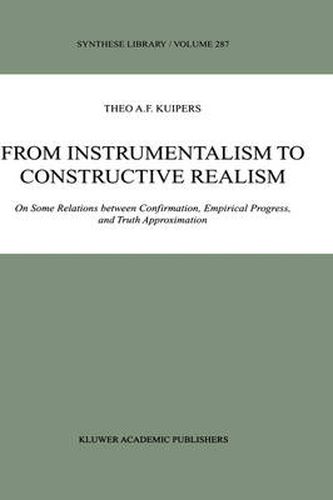Readings Newsletter
Become a Readings Member to make your shopping experience even easier.
Sign in or sign up for free!
You’re not far away from qualifying for FREE standard shipping within Australia
You’ve qualified for FREE standard shipping within Australia
The cart is loading…






This title is printed to order. This book may have been self-published. If so, we cannot guarantee the quality of the content. In the main most books will have gone through the editing process however some may not. We therefore suggest that you be aware of this before ordering this book. If in doubt check either the author or publisher’s details as we are unable to accept any returns unless they are faulty. Please contact us if you have any questions.
Surprisingly, modified versions of the confirmation theory (Carnap and Hempel) and truth approximation theory (Popper) turn out to be smoothly synthesizable. The glue between the two appears to be the instrumentalist methodology, rather than that of the falsificationalist. The instrumentalist methodology, used in the separate, comparative evaluation of theories in terms of their successes and problems (hence, even if already falsified), provides in theory and practice the straight road to short-term empirical progress in science (a la Laudan). It is also argued that such progress is also functional for all kinds of truth approximation: observational, referential, and theoretical. This sheds new light on the long-term dynamics of science and hence on the relation between the main epistemological positions, in other words, instrumentalism (Toulmin, Laudan), constructive empiricism (Van Fraassen), referential realism (Hacking, Cartwright), and theory realism of a non-essentialist nature (constructive realism a la Popper). The book explains and justifies the scientist’s intuition that the debate among philosophers about instrumentalism and realism has almost no practical consequences.
$9.00 standard shipping within Australia
FREE standard shipping within Australia for orders over $100.00
Express & International shipping calculated at checkout
This title is printed to order. This book may have been self-published. If so, we cannot guarantee the quality of the content. In the main most books will have gone through the editing process however some may not. We therefore suggest that you be aware of this before ordering this book. If in doubt check either the author or publisher’s details as we are unable to accept any returns unless they are faulty. Please contact us if you have any questions.
Surprisingly, modified versions of the confirmation theory (Carnap and Hempel) and truth approximation theory (Popper) turn out to be smoothly synthesizable. The glue between the two appears to be the instrumentalist methodology, rather than that of the falsificationalist. The instrumentalist methodology, used in the separate, comparative evaluation of theories in terms of their successes and problems (hence, even if already falsified), provides in theory and practice the straight road to short-term empirical progress in science (a la Laudan). It is also argued that such progress is also functional for all kinds of truth approximation: observational, referential, and theoretical. This sheds new light on the long-term dynamics of science and hence on the relation between the main epistemological positions, in other words, instrumentalism (Toulmin, Laudan), constructive empiricism (Van Fraassen), referential realism (Hacking, Cartwright), and theory realism of a non-essentialist nature (constructive realism a la Popper). The book explains and justifies the scientist’s intuition that the debate among philosophers about instrumentalism and realism has almost no practical consequences.